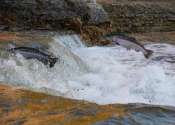Celiac friendly cereal? Research shows oats could be the answer
Research published in Nature has decoded the genome of oats and explained why the popular cereal could be suitable for most people with celiac disease and gluten intolerance.

Research published in Nature has decoded the genome of oats and explained why the popular cereal could be suitable for most people with celiac disease and gluten intolerance.
Molecular & Computational biology
May 18, 2022
1
28

A high protein diet appears linked to kidney disease and shortened lifespans for captive polar bears, a relationship similarly suspected in humans, according to a review led by Washington State University wildlife biologist ...
Plants & Animals
Jan 19, 2022
0
207

Humans cannot live on protein alone—even for the ancient indigenous people of the Pacific Northwest whose diet was once thought to be almost all salmon.
Archaeology
Apr 12, 2021
0
138

The Atala butterfly (Eumaeus atala) and its five closest relatives in the genus Eumaeus like to display their toxicity. This sextet's toxicity comes from what they eat as caterpillars: plants called cycads that have been ...
Plants & Animals
Feb 8, 2021
0
970

Changes in a few small molecules involved in a cell's metabolism seem to indicate whether a restricted "life extension" diet will actually extend, shorten, or have no effect on lifespan, a study of fruit flies has found.
Plants & Animals
Jul 9, 2020
0
94

Worldwide there is a growing demand for animal products for human nutrition, despite vegan and vegetarian diets becoming more popular in Western countries. Changing diets necessitate a substantial amount of protein as an ...
Plants & Animals
Jul 1, 2020
0
3

A microscopic algae ("microalgae") could provide a complete and sustainably sourced supplemental diet to boost the robustness of managed honey bees, according to research just published by Agricultural Research Service (ARS) ...
Plants & Animals
May 11, 2020
2
19

While many of us worry about proteins aggregating in our brains as we age and potentially causing Alzheimer's disease or other types of neurodegeneration, we may not realize that some of the same proteins are aggregating ...
Molecular & Computational biology
Feb 21, 2020
3
1427

Starting weanling pigs off with the right diet can make all the difference for the health and productivity of the animal. A new University of Illinois study shows amino acids from a new torula yeast product are more digestible ...
Veterinary medicine
Feb 21, 2020
1
10

Foxtail millet is an annual grass grown widely as a cereal crop in parts of India, China and Southeast Asia. Milling the grain removes the hard outer layer, or bran, from the rest of the seed. Now, researchers have identified ...
Biochemistry
Jan 22, 2020
1
11